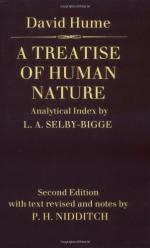
|
| Name: _________________________ | Period: ___________________ |
This quiz consists of 5 multiple choice and 5 short answer questions through Book 1, Part 3, Of Knowledge and Probability.
Multiple Choice Questions
1. Hume say the human mind resolves itself into what distinct kinds ?
(a) Impressions and ideas.
(b) Pride and prejudice.
(c) Images and words.
(d) Love and hate.
2. What does Hume claim is a fictitious denomination?
(a) The idea of unity.
(b) The idea of love.
(c) The idea of morals.
(d) The idea of justice.
3. By what does Hume say cousins are connected?
(a) Fate.
(b) Causation.
(c) Christianity.
(d) Family.
4. Which idea comes in for extended analysis in Book One, Part Three?
(a) Causation.
(b) Passions.
(c) Love and hate.
(d) Morals.
5. What system does Hume say is absurd?
(a) The German grammar system.
(b) The mathematical points system.
(c) The English grammar system.
(d) The chemistry point system.
Short Answer Questions
1. From where does Hume say sensation arises?
2. What is Hume's second tool of philosophical inquiry?
3. Hume says impressions are divided into what?
4. Which of the following best describes Hume's fork principle?
5. How does Hume define demonstration?
|
This section contains 200 words (approx. 1 page at 300 words per page) |

|




